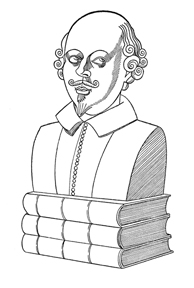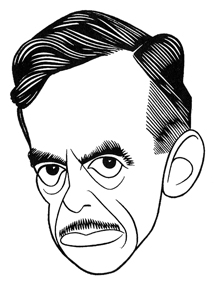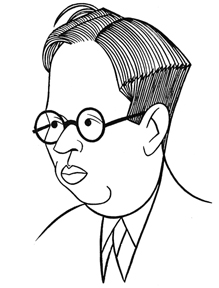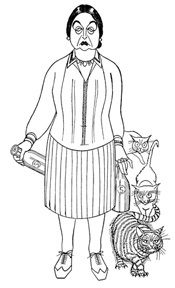In this chapter from his 1932 book, Times Square Tintypes, Broadway columnist Sidney Skolsky profiles, with tongue planted firmly in cheek, playwright William Shakespeare.
THE BARD OF AVON
WILLIAM SHAKESPEARE.—Was born April 22, 1564, in a little house on Henley Street, Stratford-on-Avon. The stunning event occurred at precisely three minutes past eight. His dad was already at work, not interested.
 He was the third child. Since then he has written thirty-seven plays, five poems and one hundred and fifty-three sonnets. Since then people have advocated Birth Control.
He was the third child. Since then he has written thirty-seven plays, five poems and one hundred and fifty-three sonnets. Since then people have advocated Birth Control.Always wears Buster Brown collars, Windsor ties, knickers and silk stockings.
His favorite eating place is the Mermaid Tavern.
It’s claimed he steals his ideas. He doesn’t deny it. Believes there’s nothing new under the sun. Hopes that some day people will steal from him.
He is vain and conceited. His favorite topic is William Shakespeare. He can talk about him for hours.
He never uses the subway. Never listens to the radio. Never sends a telegram. Never telephones. He writes all his plays in longhand. He can’t operate a typewriter.
Kit Marlowe and Ben Jonson he considers the world’s greatest men. His happiest moment was when he became the godfather of Jonson’s son.
Started his theatrical career by holding horses outside the Globe Theatre. Later became an actor. Then wrote plays to make more money.
His favorite dish is olives.
He was a wild kid, up to all sorts of mischief. Often arrested for deer stealing. Left school at the age of thirteen. At the age of eighteen he had to marry Anne Hathaway. Six months later he became the father of an eight-pound baby, Susanna.
George Bernard Shaw thinks his stuff is piffle. He never heard of Shaw.
He talks with fluency in a high tenor voice. Has reddish hair, a pointed chin, a face that mirrors every change of emotion.
His main weakness is that he is overfond of sleep. No matter what time of day it is, or where he is, he can fall asleep at a moment’s notice. He has never spent a sleepless night. Sleeps at least fourteen hours every day.
Rewrites all his stuff at least three times. Once rumored that Samuel Shipman was “ghost writing” his plays. This was discarded when critics proved that Shipman couldn’t write that bad no matter how hard he tried.
He dislikes bacon.
Is gentle, gay and witty. His wisecracks generally get him into trouble. Because of one of his flippant remarks he can’t break into the movies. He said: “All the World’s a Stage.”
He can’t carry his liquor. Two glasses of ale has him hugging the floor.
He refuses to allow Jed Harris to produce his play Hamlet because he doesn’t want George Abbott to rewrite it.
He hobnobs with actors, stagehands and producers. Yet he is on intimate terms with Lord Pembroke, the Earl of Essex, the Earl of Southampton and the Prince of Wales.
He has made his will. In it he states that to his wife he leaves his second best bed.
His right ear is a little larger than his left. Says this is so because he sleeps on his right side.
His ambition is to write a play which the Theatre Guild will produce.



